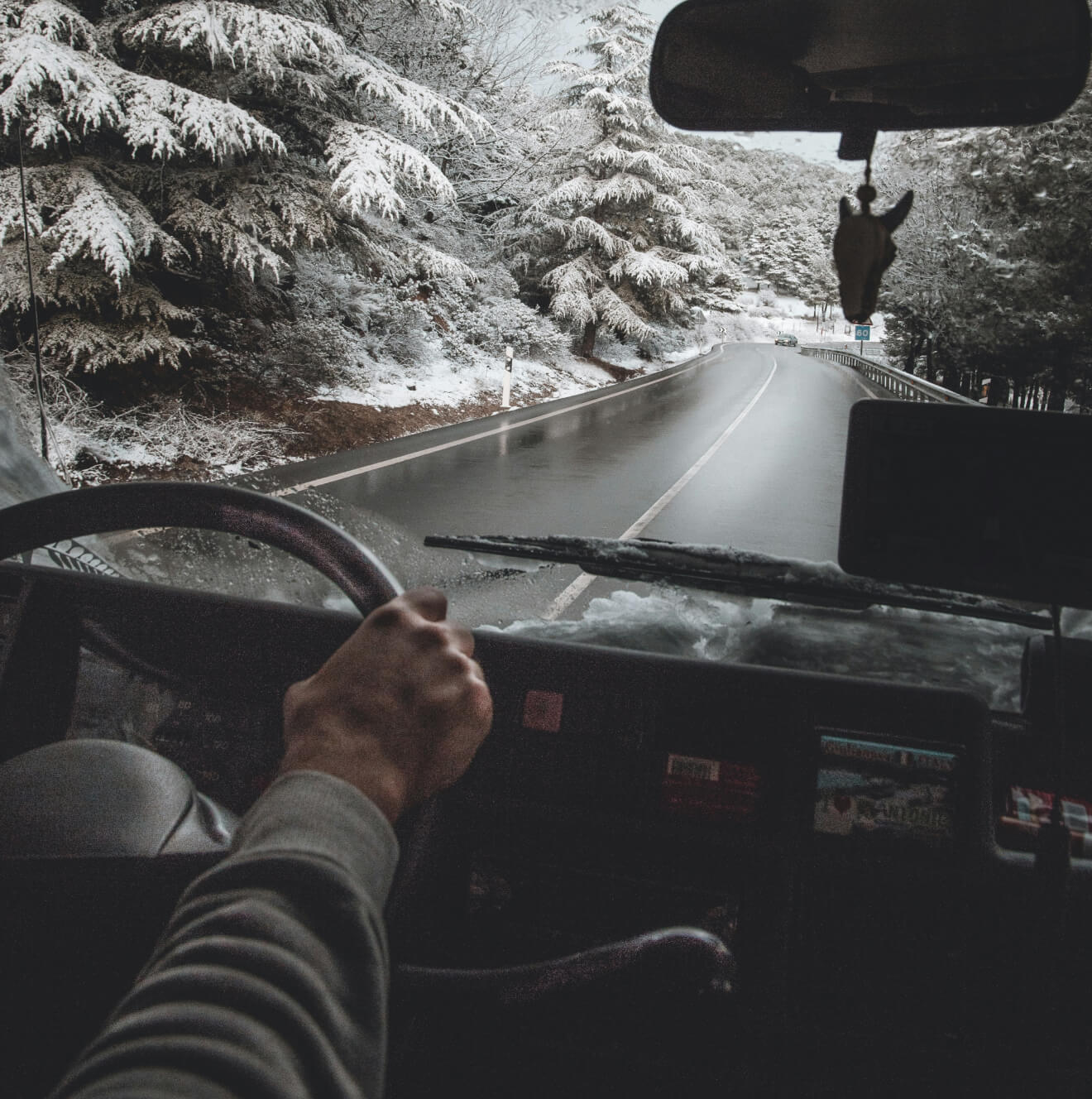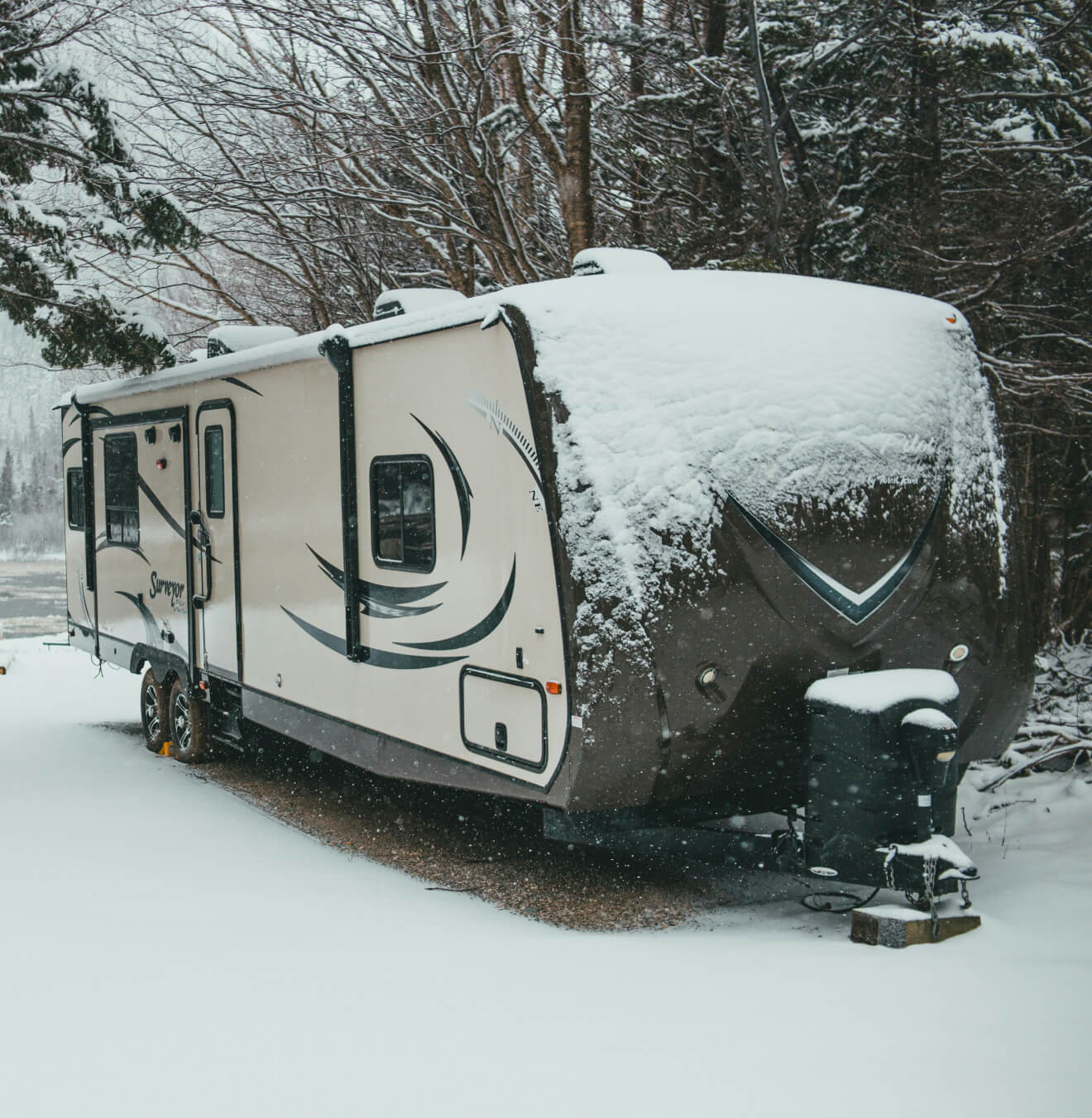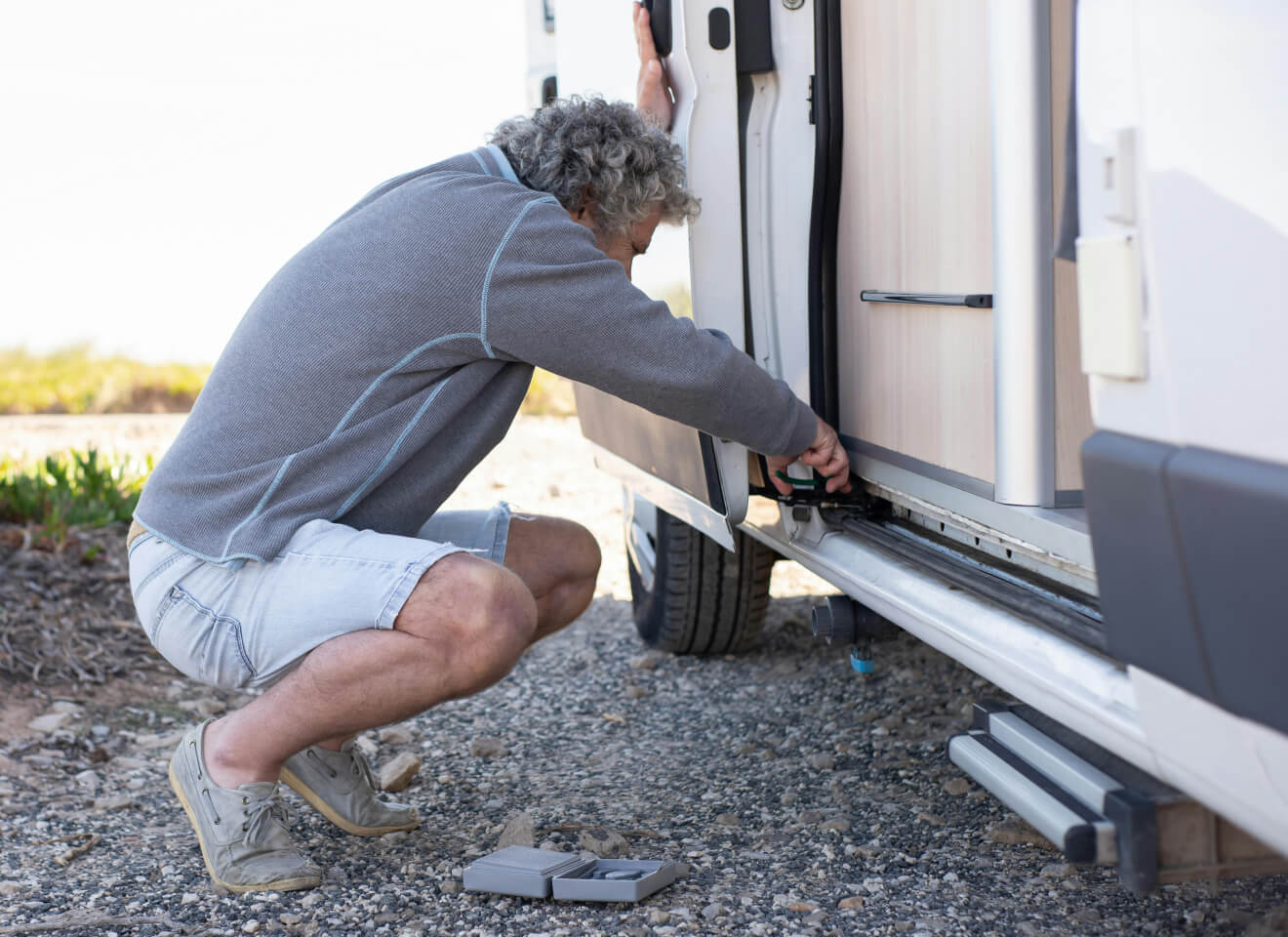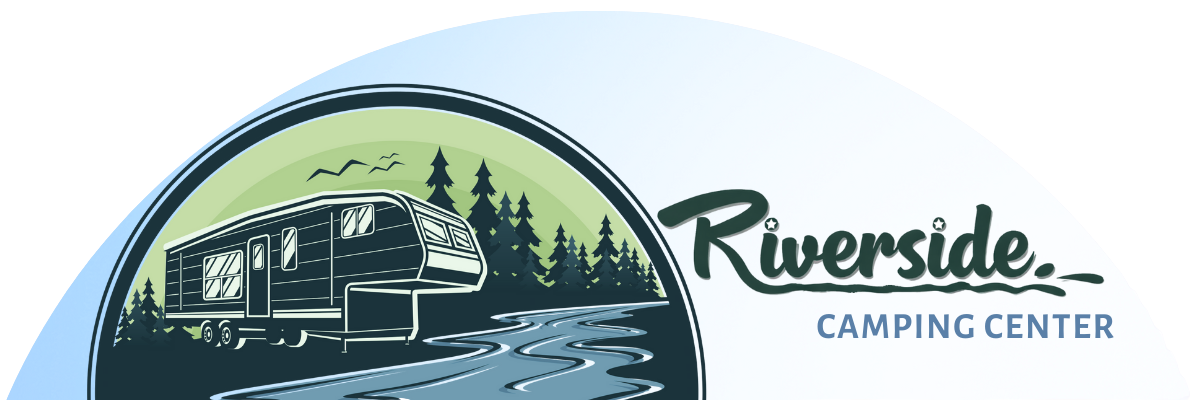RV Winterization At Riverside Camping Center In New Bern, NC

Looking to learn how to winterize RV homes or travel trailers? You're in the right place. Whether you want to winterize an RV for winter storage or get it ready for winter camping and living, our team at Riverside Camping Center outlines the steps in our handy walkthrough. So, what is included in RV winterization? The process involves protecting your plumbing, batteries, and appliances during freezing temperatures. Explore the guide and checklist below to get started. Don't want to do it yourself? Bring your camper to our service center in New Bern, NC, for a totally hands-off winterizing experience.
RV Winterization at a Glance
- Protect Plumbing: One of the main purposes of winterizing your RV is to protect your plumbing from bursts and cracks in freezing weather by draining water lines and pipes and adding RV antifreeze.
- Tanks and Traps: This process involves completely emptying your tanks and adding antifreeze to every P-trap and the toilet bowl.
- Filters and Appliances: When adding antifreeze, you'll want to bypass water filters and appliances like the water heater.
- Battery and Engine Prep: Before putting your RV in storage, disconnect and charge your batteries, fill fuel, add fuel stabilizer, and change your engine and generator oil.
- Final Checks and Seals: Inspect hoses, fittings, and roof and window seals.

What Is the Purpose of Winterizing an RV or Trailer?
If you live in an area where it gets below freezing in the winter, and your RV will be in storage, winterizing is essential to protect the plumbing, appliances, and battery. Anyone who lives near Raleigh, NC, knows we have our fair share of below-freezing weather in the winter.
Winterizing is essential for any RV, travel trailer, or fifth wheel that has a plumbing system. However, it's not just for plumbing: The process also ensures your batteries are protected in cold weather and that you check for any cracks in your seals and windows to prevent rain and snow from entering and causing water damage.
For the plumbing, the process to winterize RVs and campers is to drain all the freshwater from the system, often using an air compressor to blow out the lines, and running RV antifreeze through the pipes and drains. RV antifreeze is different from standard vehicle antifreeze in that it is nontoxic and safe for potable water systems. It protects your drains and pipes from bursting in freezing weather.

Quick Reference: Winterize Camper Checklist
Tools and Supplies Needed:
- RV Antifreeze (not automotive antifreeze)
- Air compressor
- Blowout plug adapter for air compressor
- Basic tools

Winterizing Your RV Checklist
- Disconnect from city or freshwater source.
- Drain your water heater.
- Open low-point drains.
- Open all faucets, including the shower.
- Drain the fresh-, gray-, and blackwater tanks.
- Attach blowout plug adapter to the city water connection to connect air compressor.
- Blow out water lines with the air compressor.
- Remove air compressor.
- Bypass your water heater.
- Add RV antifreeze, making sure to run it through all faucets, including the exterior showers and sinks, if applicable.
- Add RV antifreeze to toilet bowl to protect seal.
- Disconnect batteries and remove from the RV because cold weather can damage them; using a maintenance charger for the winter is ideal.
- Check seals on roof and around windows, adding caulking where necessary.
- Cover RV and tires if not storing in covered or enclosed storage.

How To Winterize a Travel Trailer or RV for Storage
It's highly recommended to winterize RVs with an air compressor to ensure all water is removed from the lines. As water freezes, it expands, which is what causes burst pipes and damaged plumbing connectors.
RV antifreeze for winterizing is also an essential step, because it doesn't freeze. It mixes with any potential water left in the system to prevent it from freezing and cracking your pipes or fixtures. The point of bypassing the water heater is to make sure it doesn't fill up with RV antifreeze, as draining it is enough to protect it from damage.
Winterize RV Process
To get started, drain your water heater and black and gray tanks. Next, open your low-point drains and drain your freshwater tank, too.
Then, open all your faucets to drain the residual water from the lines. Open both the cold and hot water faucets in the kitchen, bathroom sink, showers, and exterior sinks and showers. Flush your RV toilet until no more water runs through the bowl.
Once you have drained all the water out of the faucets and tanks, you can attach the air compressor using a blowout plug adapter to the city water connection. You can blow out one faucet at a time, or keep them all open as you push air through the system. After this, you can remove the air compressor and bypass your water heater.
Next, you'll add antifreeze to the system, running it through one faucet at a time and ensuring some goes into each sink so it can sit in the P-trap of each drain. It is not necessary to add antifreeze to your tanks, although some people prefer to have a small amount in each tank for protection.
Pour about an inch of RV antifreeze into your toilet bowl to keep the seal moist and protect it during the winter, and also make sure that you run it through your exterior showers, faucets, and drains.
If you have appliances like a washing machine or RV dishwasher, look at your user manuals or online videos for winterizing instructions for the specific models.
After making sure you have drained the water from all pipes and added RV antifreeze through all pipes, faucets, and drains, it's time to remove your RV batteries, clean the interior of the RV to deter pests like mice, and check all exterior seals, including the roof, windows, corners, and seams. Caulk and seal any cracks to prevent water damage.
After this is done, your RV is ready for storage! At Riverside Camping Center service center, we understand that winterizing your RV can feel like an overwhelming task, especially if you don't have the tools or time. That's why we offer an RV winterizing service where we handle all the hard work for you.
Contact us or use our online form to schedule an RV service appointment where we can help with winterizing, RV battery and tire maintenance, and more.
How To Winterize an RV for Winter Living
Winterizing your RV for winter storage vs. winter living involves very different processes. If you are living or camping in your RV during freezing temperatures, chances are you probably want full use of the plumbing systems. Therefore, you won't need to remove all the water or add RV antifreeze to your system. Instead, the focus should be on keeping your tanks and pipes above freezing to prevent bursts or cracks. Here are some tips for winterizing your RV for winter living.
- If your RV doesn't have a heated underbelly, consider adding heat tape and foam insulation to external pipes and fixtures.
- Consider adding heating pads to the black and gray tanks to keep them from freezing.
- Bypass and drain external faucets and showers.
- Fill your freshwater tank and disconnect city water to prevent a frozen hose and external connections. A full freshwater tank takes much longer to freeze than a thin hose, and you can also consider adding heating pads to the tank.
- Keep your RV furnace going to maintain a heated interior, and open the cabinets to expose the pipes and keep them warm.
- Disconnect the RV sewer connection and keep black and gray tanks closed during freezing weather to prevent a frozen RV sewer hose.
- Do not let RV faucets drip; focus on keeping the RV heated and the pipes warm and insulated.
Winterize RV Plans: DIY or Riverside Camping Center Service Center?
← Drag to scroll →
| DIY | Service Center | |
|---|---|---|
| Supplies Needed | Air compressor, RV antifreeze, blowout adapter, basic tools | None, we handle it for you |
| Process Complexity | Moderate to high | Handled for you |
| Risk of Missed Lines or Damage | Possible if any lines or valves are overlooked | Techs pressure-test and verify all systems are protected |
| Convenience | Must do everything yourself, can be labor and time-intensive | Hands-off, the service center handles everything for you |
| Added Benefits | Learn your rig's plumbing system and save money | Saves you time and labor, protects against beginner mistakes, and can bundle with other routine maintenance like battery and tire service |
| Best For | Experienced RVers or those on a budget | New owners or anyone short on time or tools |
If you're new, short on time, or short on tools, winterizing your RV can feel pretty overwhelming and intimidating. But we're here to help! Let the pros at Riverside Camping Center handle the process for you. We have a full service center and plenty of RV parts and tools to get the job done! Contact us today.
Frequently Asked Questions About Winterizing Your RV
When should I winterize my RV?
The best time to winterize your RV is before overnight temperatures consistently drop below freezing or before putting it in storage for the winter. It's essential to winterize before temperatures go below freezing overnight to protect your plumbing from burst pipes. Burst pipes are difficult and costly to fix, and they cause water damage and potential equipment failure. Removing water and adding RV antifreeze prevents this from happening.
How long does it take to winterize an RV?
The time it takes to winterize your RV depends on your experience level, preparedness, and the complexity of your RV's plumbing system. For your first time, it may take up to three or four hours. If you have experience or a simple plumbing system, it can take as little as 30 minutes to an hour. Or, let us handle it and pick up your rig at your convenience!
Do you offer RV winterization service?
Yes, we offer RV winterization service here at Riverside Camping Center in New Bern, NC. We will drain your freshwater system, bypass major appliances, add RV antifreeze, and check your seals and roof. We also remove your batteries and do everything we can to ensure your RV is ready for winter living or storage. Call us to learn more about our RV winterization service today.

